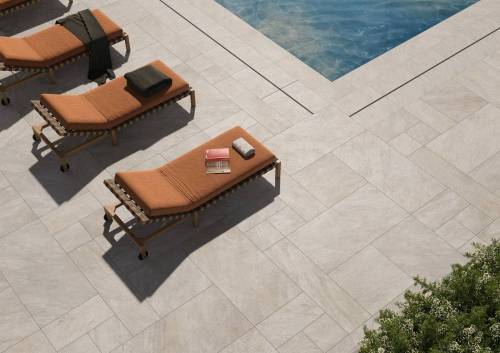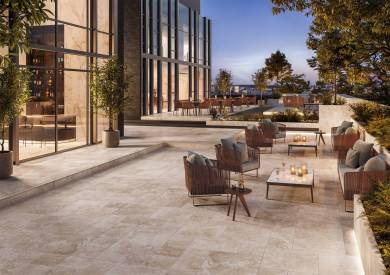Porcelain pavers vs concrete pavers: a guide to pros and cons
Are you thinking about giving your outdoor living area a new look? Or maybe, after postponing it for a long time, you have finally decided to fix up your walkway? Are you thinking about remodeling your patio, and maybe even putting in a nice pool?
Whatever your need is, when it comes to making substantial decisions for your home, like choosing the best hardscape material for your outdoor, it is important to correctly identify all available choices and gather all important information to make the most informed decision possible. This guide will help you better understand the advantages and limitations of two popular hardscaping materials: read more about porcelain pavers vs concrete pavers.
PORCELAIN PAVERS VS CONCRETE PAVERS: A GUIDE FOR AN INFORMED CHOICE
When planning and designing a new floor for your outdoor area, whether it is for a walkway, a patio, a swimming pool, or even a residential driveway, two materials that immediately come to mind are porcelain and concrete. Two popular products that for the less experienced ones may appear similar but, in reality, have significantly different characteristics that can lead to substantially different results in in terms of overall look, durability and ease of maintenance of your outdoor project.
For this reason, the first question that arises when approaching your outdoor project is: porcelain pavers vs concrete pavers, what are the pros and cons of these materials? Here below we will try to clarify your ideas, explaining the many advantages and disadvantages of these two different products.
PORCELAIN PAVERS VS CONCRETE PAVERS: HOW ARE THEY MADE?
First all, in order to fully understand the characteristics of these materials, it is necessary to have a rough idea on how concrete pavers and porcelain pavers are made, because their production process guides some of their most distinctive features.
On one side, concrete pavers are man-made pavers that are manufactured by pouring concrete in molds with specific shapes, sizes and textures. The concrete is also dyed to make it resemble the look and appearance of the natural stone of reference. This simple and low-cost manufacturing process makes concrete pavers a durable and affordable material, suitable for many uses but, at the same times, limits its range in terms of looks, colors (as the main input is concrete) and sizes. Additionally, one of the main distinctive physical characteristics of concrete, its porosity, can affect its longevity and its ease of maintenance and cleaning.
On the other side, porcelain pavers are part of a broader category of construction materials named ceramic. The term refers to products derived from a mix of purest natural materials such as clays, sands, quartz, kaolin and feldspar. Porcelain, like ceramic, is made without the addition of any resin, glue or cement. After proper treatment, the ingredients are mixed and molded with no resin or added adhesives into a desired shape, pressed at more than 500kg per cm2 and then fired at temperatures up to 2500° F in industrial kilns. This firing allows porcelain to achieve the suitable vitrification of the mix that makes the product totally unabsorbent (less than 0.5% absorption rate), resistant to abrasion, frost and acid proof and extremely durable.
Compared to classic ceramic tiles, porcelain is denser and therefore less porous, making it more durable and better suited for heavy usage (both commercial and residential). Compared to classic porcelain tiles, which are traditionally used for indoor applications, porcelain pavers are thicker, making them able to withstand heavier loads, and their surface is characterized by higher anti-slip performances, making them a safe material for outdoor applications and wet areas.
Since porcelain pavers are obtained through the combination of many raw materials the palette of colors, graphic variability, and range of looks, finishes and textures are endless and the production process also allows to recreate various sizes, from the smallest to the largest ones.
PORCELAIN PAVERS VS CONCRETE PAVERS: AESTHETICAL APPEAL
As mentioned in the previous paragraph, due to their production process, concrete pavers can be limited in terms of looks and colors and can exhibit less variation in shades and light compared to Porcelain Pavers.
On the other hand, high quality porcelain pavers can be nearly identical to natural stone and wood since their graphics are very well defined and exceptionally rich in color nuances, shades depth and light variation. Porcelain pavers can also incorporate special and micro effects that make it difficult even for the most well-trained eye to tell the differences between porcelain pavers and natural stone. Furthermore, the possible looks that porcelain pavers can recreate are endless, from flagstone to limestone, from bluestone to travertine, from terrazzo to quartz, from wood up to original and colorful designs.
PORCELAIN PAVERS VS CONCRETE PAVERS: VERSATILITY AND INSTALLATIONS
Both materials can be a perfect fit for a vast range of different hardscaping applications, such as patios, walkways, pool decks, rooftops, and even driveways. With ¾ of an inch thick porcelain pavers that are suitable for light vehicular traffic while concrete pavers and interlocking concrete systems that can withstand regular and high vehicular traffic in driveways and roadways.
Speaking about installations, both products can be installed in numerous ways: they can be installed over reinforced concrete, using the more traditional mortared bed, over decking or raised floors or they can be installed directly onto grass, gravel or sand.
Installations of concrete pavers is made even easier given the fact that is an easy-to-cut material, while porcelain pavers, being a very hard and dense material, cannot be cut with regular or chip blades that could wear down very quickly, but must be cut using a wet saw with a blade made specifically for porcelain in order to avoid cracking. Although, harder to cut, after proper installation, porcelain pavers return more durable and stronger applications that can be enjoyed for many years to come.
PORCELAIN PAVERS VS CONCRETE PAVERS: STRENGTH, RESISTANCE AND DURABILITY
Concrete pavers are a strong material that can withstand heavy loads and that is not usually subjected to chipping or cracking, especially in the form of interlocked pieces which allow better expansion and contraction. However, depending on the quality, the surface of concrete pavers can gradually erode with time, the finish can wear away completely and expose the composite material underneath and the color may even fade away over time if they are exposed to direct sunlight.
On the other hand, porcelain pavers are extremely durable thanks to the fact that it is a harder and denser material that has been engineered to reduce breakage and withstand loads up to 2,200 lbs. Although, before and during installation porcelain pavers can require extra care in order to reduce the possibility of cracking them or chipping them. Once installed, porcelain pavers offer excellent durability, strength and resistance to breakage and scratches and, unlikely concrete pavers, do not wear and tear and their color do not fade away.
PORCELAIN PAVERS VS CONCRETE PAVERS: WEATHER RESISTANCE
Both products perform well and can survive in very hot and very cold climates, with porcelain pavers having even better performances compared to concrete pavers due to their practically zero water absorption that make them unaffected by frost and freezing temperatures and resistant to freeze/thaw cycles (porcelain pavers can in fact resist to thermal shocks ranging from - 60 F to +140 F). Additionally, porcelain pavers resist degradation from salts, unlike concrete pavers, for which the use of salt for ice removal can damage the surface through corrosion and lead to discoloration, cracking and crumbling.
PORCELAIN PAVERS VS CONCRETE PAVERS: MAINTENANCE AND CLEANING
When choosing the best hardscape material for your outdoor, finding a low maintenance product is key in order to avoid spending your free time cleaning up your floor. In this regard, porcelain pavers represent a smart solution because they are stain and chemical resistant and they do not need to be sealed, all of which means that minimal maintenance is needed. Concrete, being a more porous and less dense material, can be penetrated by most liquids, such as oils, grease and chemicals and therefore can be easily stained and therefore must be protected through the use of sealing which should be re-applied over the paver’s lifespan.
All being said, you might consider that the pavers require a bit more time for maintenance and upkeep.
PORCELAIN PAVERS VS CONCRETE PAVERS: PRICE
Both options are a low-cost alternative to natural stones with concrete pavers, thanks to their easy manufacturing process, usually cheaper than porcelain pavers.
Although, porcelain pavers require a higher initial economic investment, we must consider that porcelain pavers last much longer and that the initial investment is amortized over time, requiring little maintenance at very low prices.
PORCELAIN PAVERS VS CONCRETE PAVERS: FINAL COMPARISON
All being said, now that you have a better idea on the differences between these two products, you can see how porcelain pavers can represent a preferable solution for those who prioritize longevity, low maintenance and aesthetical appeal. Whereas concrete pavers are a good option for the most budget-conscious people and for do-it-yourselfers who are less familiar with cutting and installation techniques of hardscaping material and that want to carry on complex outdoor projects.
As a last note, during your purchase decision, remember to take into consideration not only your budget, but also the space you are paving, the climate and the time you will be able to spend cleaning and maintaining your outdoor area.
If you still don't have clear ideas and would like to have the opinion of an expert, browse our gallery and contact us to tell us about your project. We will find together the solution that best suits your tastes and your specific needs.
To sum up:
| PROS | CONS | |
|---|---|---|
| PORCELAIN PAVERS |
|
|
| CONCRETE PAVERS |
|
|










